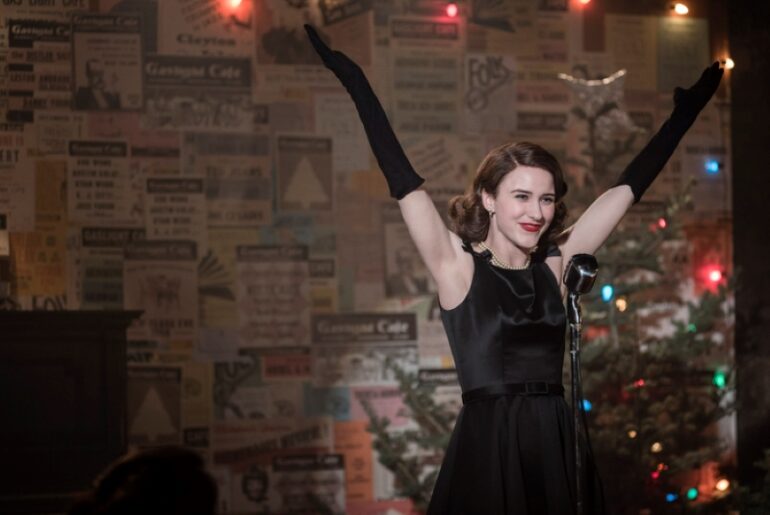The Marvelous Mrs. Maisel is a series that questions the gender roles through Miriam Maisel’s unexpected career in comedy. Her journey from housewife to comedian is full of challenges for her and the 21st-century audience. The series encourages everyone to question their position in and against hegemonic masculinity.
By Lamia Berki
Picture: © Amazon Studios
The Marvelous Mrs. Maisel is an Amazon Prime series about Miriam »Midge« Maisel, a young married woman on the Upper West Side in 1950s New York. In the opening scene, she is introduced to the audience giving a toast at her own wedding, talking about how marvelous she is. Well, most of the time, people who boast about themselves seem annoying. In the case of Miriam, she can indeed be annoying for those who are the victims of her jokes. The audience sees her as being pretty and annoying on the path of becoming a comedian, which she unintentionally embarks upon being left by her »knight in shining armor«, Joel Maisel.
Pretty and Annoying
What is compelling about Miriam is to see her struggle with herself and against society as she tries to find her place in a world in which women can only be one thing. Her pretty side, in this context, represents the expectations for women and wives in the eyes of 1950s society by complying with the rules of hegemonic masculinity. Her annoying side, on the other hand, can be correlated to the rebellious actions she takes against societal expectations by subverting the derogatory attribute ›annoying‹ and turning it into a career as a comedian.
As for the series itself, which was created by Amy Sherman-Palladino (also known as the creator of »Gilmore Girls«), it continues to get big laughs from the audience while warming their hearts with its glamorous 1950s New York setting. The first season was released in the winter of 2017, and the second one a year later in 2018. The glittering atmosphere of this American period comedy-drama whose 4th season will be released on February 18, 2022, will be a welcome break from the dark winter days full of corona regulations.
Cringe Alert for Feminists
From the opening scene, Midge makes it clear that she has been meticulously planning everything in her life: From minute details like her haircut to decisions like her high school, university degree, and husband-to-be. She proudly announces that she is a go-getter. Her courage, witty remarks, and control freak yet cheerful behavior are charming. Throughout the pilot episode, she tries to hide her self-care routine from her husband. The obsession with her bodily image is revealed through her measuring her body every day. In addition, she struggles more than her husband for his comedy career. When he breaks up with her, she is worried about what people will think if Joel leaves her a day before the Rabbi visits them on Yom Kippur – even more than about her relationship. To cut to the chase, she does not seem feminist enough.
What might be troubling for the audience is the fact that Miriam raises expectations of her being rebellious and aware of societal injustice, judging from her marvelous act at the wedding, but then she complies with the rules of hegemonic masculinity. As opposed to the self-confident image she draws of herself in her gig-like toast, she is very much afraid of her happily-ever-after life coming to an end. She seems to live her life as if she followed the instructions given in a Brisket recipe: She is deeply concerned about the large forehead of her baby, let alone revealing to her husband what she looks like without make-up in the morning. To that end, she does not hesitate to get up every morning before her husband wakes up during their marriage. She perfectly manages to fit into a society which expects her to be a good, supportive, and beautiful wife besides being a mother. She makes the audience feel like she inherently embodies all these qualities rather than seeming like she is forced into it. Yet, the series offers more than that. Although 21st-century viewers might cringe at her compliance, Mrs. Maisel proves herself and the viewers to be courageous enough to break free from societal expectations through a tough process.
Is She Marvelous or Scandalous?
The opening scene sets the tone for the rest of the series. It offers an ambiguity for the guests at the wedding and, especially but not limited to, the women audience of the 21st-century about the gender roles. Miriam is not aware of this conflict at the beginning, and that is something to appreciate The Marvelous Mrs. Maisel for. The audience must go through the arduous path with her as she questions her feelings about her identity and the gender roles of her time. The character Midge in the first scene appears like she is all that. Although the women around her seem to be fine with hegemonic masculinity, Miriam comes across as independent and funny as a woman. Her following domestic behavior might disturb the feminist audience through the triggering of disidentification: »not being like that, not being like those other women, not being like those images of women.«1Brunsdon, Charlotte. »Feminism, Postfeminism, Martha, Martha, and Nigella« Cinema Journal, Vol. 44, No. 2 pp. 112. https://www.jstor.org/stable/3661098. The series allows the audience to gain awareness of their disidentification upon seeing Midge complying with the rules of society until they realize it is subject to change through the interplay of plot and character.
The Marvelous Ms. Maisel
USA 2017-today
4 seasons, 26 episodes
Idea: Amy Sherman-Palladino
Starring: Rachel Brosnahan, Michael Zegen, Alex Borstein, and others
Her fluctuating stance towards being a housewife and an independent woman is well-reflected throughout the show. When her seemingly perfect life shatters, a profound change becomes inevitable for her and the perception that the audience gains of her. As she tries to find a balance between the role of a housewife and an independent woman, a subtle shift in the audience from »I am not like her« to »I might have been her« becomes thought-provoking in reflecting whether they are opposite parts or not. This suggestiveness is what makes this series exquisite.
It’s Show Biz!
Watching The Marvelous Mrs. Maisel is like a sneak peek of show business. The camera shots, the play of colors and light, clothing, the make-up, the grandeur, they are all there for the audience to enjoy while being fully aware that it is not real. It offers an escape from reality like a Broadway show. The praise of cinematography belongs to M. David Mullen, who won a Primetime Emmy award for his »outstanding cinematography for a single-camera series«. It serves not only the eye but also the general flow of events. Mullen visually expresses the story in which Amy Sherman-Palladino shows the process of creating a comedy show and brings it onto the screen. Meticulously chosen plot elements such as failure, change, criticism, applause, acting, and intimacy in the gigs of the comedians intermingled with the events in the life of Miriam reveal so much about show business and society. The rippling effect of the individual decisions changes the characters bit by bit, even if they must fight for or against it.
The most eye-catching element in the production and cinematography is the acting. The performance of Rachel Brosnahan feels like she was born for this role, yet she is not the only one astonishing the audience with their excellent acting skills. Alex Borstein, Michael Zegen, Marin Hinkle, Tony Shalboub, and all the other actors*actresses in the series contribute to the production in that everything is in the right place. The characters who seem to be stereotypes reveal themselves as unique individuals, which creates the same effect achieved through Midge. Overall, the atmosphere in the production has been highly crucial for the appraisal of the series. Therefore, it would be fair to say that The Marvelous Mrs. Maisel is worth watching.






